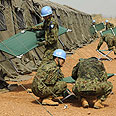
What about UN crimes?
Op-ed: IDF actions pale in comparison to crimes committed by UN peacekeeping forces
The YouTube video of Israeli Lieutenant Colonel Shalom Eisner hitting a Danish provocateur “peace activist” with the butt of his gun has become world news. To get a better perspective on the true importance of this “affair,” one should compare it with the conduct of soldiers elsewhere in the world.
The best point of reference is the Peacekeeping Forces of the United Nations. This organization issued the Universal Declaration of Human Rights and the non-initiated would expect its soldiers to be “a light unto the nations.”
In Haiti in 2005, UN peacekeeping troops killed 23 people, including children, in a poor area of Port au Prince. Doctors without Borders reported that they had treated 27 people for gunshot wounds - around 20 of them were women under the age of 18. In December 2007, more than 100 UN soldiers from Sri Lanka were deported under charges of sexual abuse of underage girls.
A video was also released showing four Uruguayan troops in Haiti laughing while allegedly raping an 18 year old Haitian boy. Two Pakistani peacekeepers were recently sentenced for raping a 14 year old Haitian boy. There are also strong claims that fecal waste from UN troops deposited in a river spread cholera bacteria in Haiti which killed more than 6,000 Haitians and infected more than 400,000.
There are older accusations of Italian and Dutch UN soldiers having sex with young prostitutes in Eritrea, some of whom were 10-11 years old. Reports from 2006 mention sexual abuse of girls as young as 13 by UN peacekeepers in the Democratic Republic of Congo. In 2007, the Daily Telegraph reported on UN peacekeepers and staff abusing children in southern Sudan. Other reports concerned sexual and other abuse in Burundi, Liberia and Ivory Coast.
A study by Cornell Law School stated, “The problem of sexual abuse and sexual exploitation… has occurred among the military and civilian personnel of a wide range of countries from all parts of the world.”
There are pictures of a Belgian soldier from the UN Restore Hope mission urinating on the face of a dead Somali. Another picture shows Belgian soldiers roasting a living Somali over a fire. Canadian soldiers killed three Somali teenagers, of whom at least one was tortured. They also bound and beat others and made videotapes of themselves boasting that they “ain’t killed enough niggers yet.”
A Canadian general reacted by saying that “in stressful circumstances, this should be accepted.” In 1997, 47 Canadian UN troops serving in Bosnia were accused of “drunkenness, sex, black marketeering and harassment of patients at the mental hospital they were guarding.”
Rwanda fiasco
The NGO Save the Children UK revealed cases of abuse associated with 23 humanitarian peacekeeping and security organizations. These include civil humanitarian agencies such as those delivering food and nutritional assistance, care, education and health services, reconstruction, shelter, training, and livelihood support, as well as military actors providing peace and security services.
Yet this small selection of crimes pales when compared to the role of the United Nations and its peacekeeping forces in the genocides in Rwanda in 1993 and Bosnia in 1995. Canadian General Romeo Dallaire, Commander of the UN forces in Rwanda, saw the genocide coming and contacted his UN superiors months before the murders. His requests to undertake deterrent actions were turned down seven times. When the mass murders started, the UN cut its force in Rwanda from 2,600 to 450.
When the Bosnian Serbs conquered Srebrenica, a town which the UN had guaranteed safe haven status, Dutch peacekeepers fled upon instructions of their government. This after they helped separate the Muslim men and boys from the women. An estimated 6,000-8,000 Muslims were killed by the Bosnian Serbs.
To make matters worse, the UN itself cannot be prosecuted for the disasters it has played a role in. This was confirmed by a recent judgment of the Dutch Supreme Court. The UN people who made the decisions which facilitated the Rwanda and Srebrenica genocides are far more senior than Colonel Eisner will ever be.
If one were to include in the list of abuses, besides those by UN Peacekeepers, those of Western armies, they would fill a few books. The Eisner Affair would not even merit a footnote.
Eisner’s acts should have been investigated and judged exclusively by the army itself. Before Israeli politicians jump to exacerbate such a case, they should investigate what happens elsewhere. And regarding Israel’s answer to the Danish ambassador’s questions about the Eisner incident, it should have included the hardly publicized story of how 200 fully armed Danish soldiers stood by in Croatia when nine handicapped Serbians were executed before their eyes.
Dr. Manfred Gerstenfeld has published 20 books. Several of these address anti-Israelism and anti-Semitism










